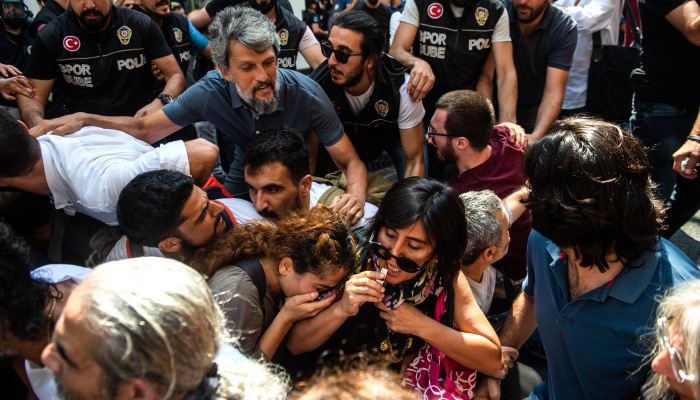The Saturday Mothers, a group of activists and relatives seeking the whereabouts of loved ones who disappeared while in police custody in the 1990s, and the İstanbul branch of the Human Rights Association (İHD) have filed a criminal complaint against Turkish Interior Minister Süleyman Soylu, who banned the years-long sit-in of the Saturday Mothers, Turkish media reports said on Monday.
The 700th gathering of the Saturday Mothers was prevented by Turkish police who used force against the demonstrators upon an order from Soylu on Aug. 25.
The İstanbul police used plastic bullets and tear gas to disperse the demonstrators and detained as many as 50 people including the relatives of missing persons and İHD members. Some of the demonstrators were handcuffed from behind.
Representatives from the Saturday Mothers and the İHD filed the criminal complaint at a courthouse in İstanbul’s Çağlayan district on Monday.
Relatives of missing persons unfurled banners in front of the courthouse that read: “We will never give up looking for our missing relatives,” and “No to unlawful bans.”
Pro-Kurdish Peoples’ Democratic Party (HDP) deputies Ahmet Şık, Ali Kenanoğlu and Saruhan Oluç were also in front of the courthouse to lend support to the families.
The Saturday Mothers, who first gathered on May. 27, 1995 in Galatasaray Square on İstiklal Street, have been the longest-running protest Turkey has ever witnessed. They protest questions unanswered by the authorities about the disappearance or unsolved murders of their loved ones after being taken by security forces, and the lack of justice in court.
Unsolved murders and disappearances were frequent occurrences in the late 1980s when tension between two terrorist groups, Hizbullah and the Kurdistan Workers’ Party (PKK), grew violent.
The disappearances are also known as the “white Taurus” (Beyaz Toros) incidents since gendarmerie intelligence and the JITEM counterterrorism unit put people into white Renault Toros cars and never brought them back. The remains of some people who were forced into those cars have been discovered in forests, garbage cans and rural areas, and some people have never been found.

